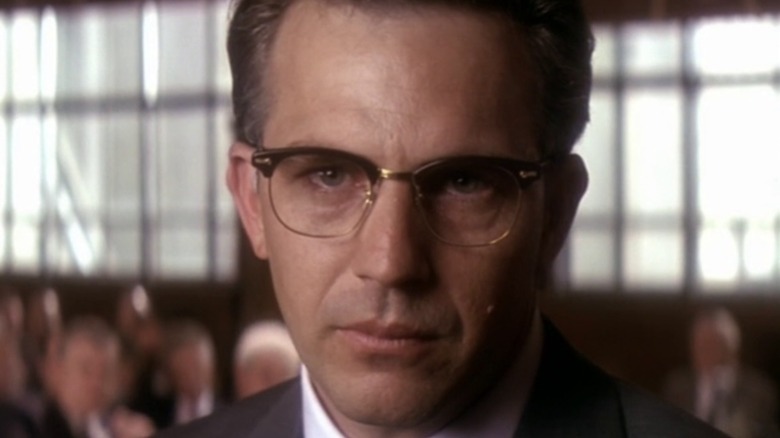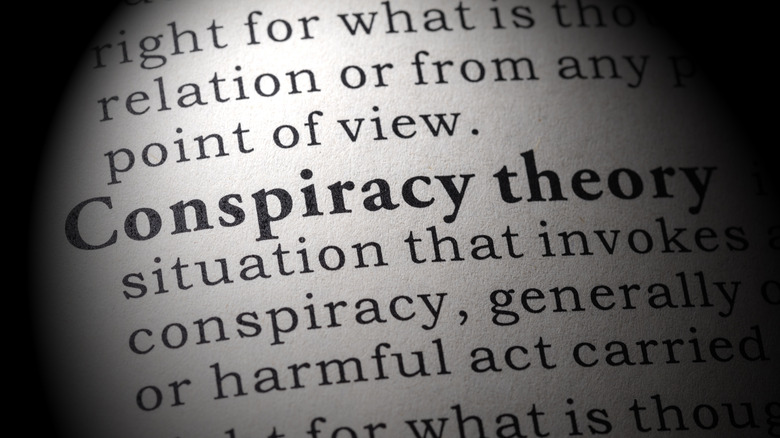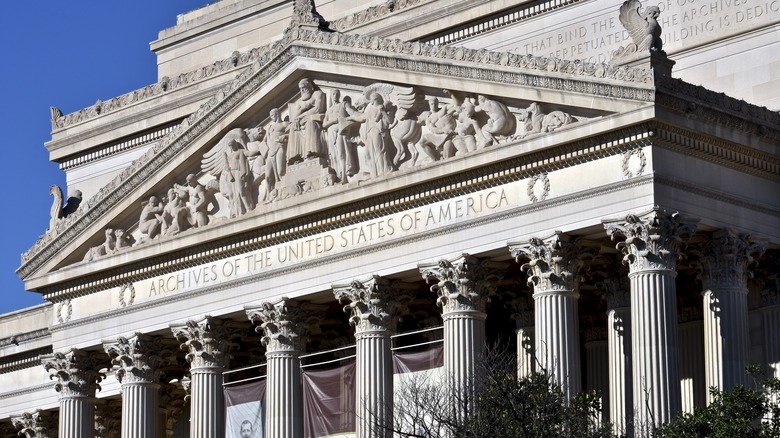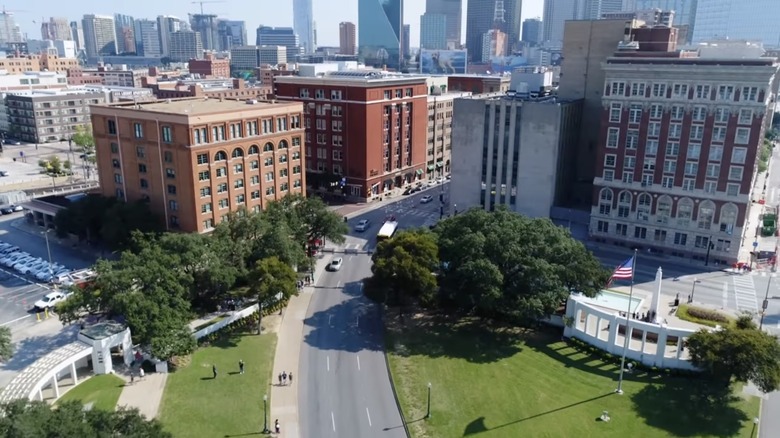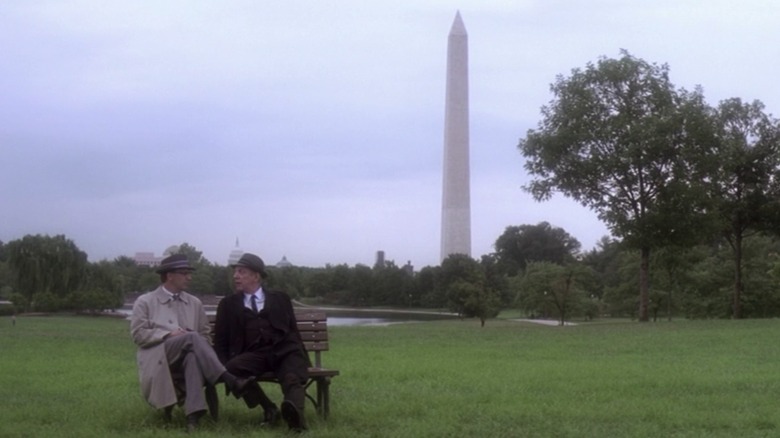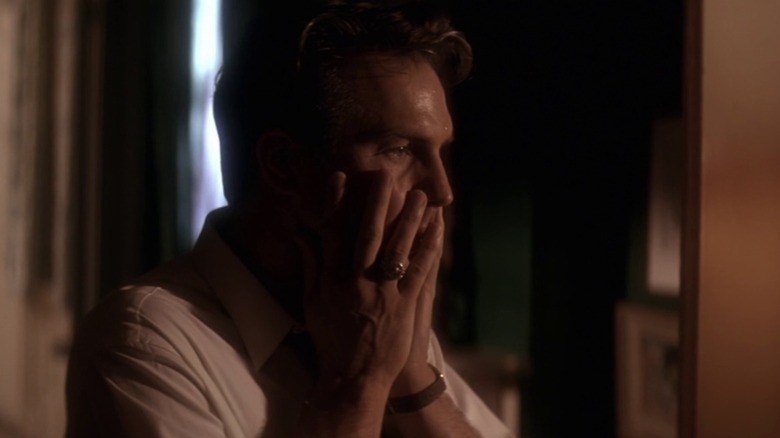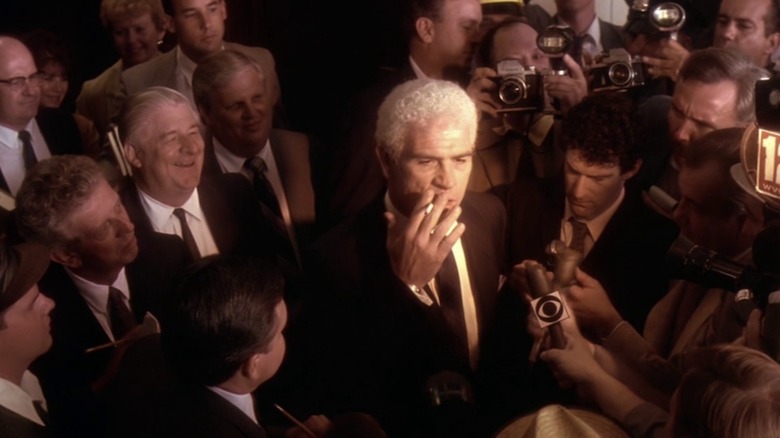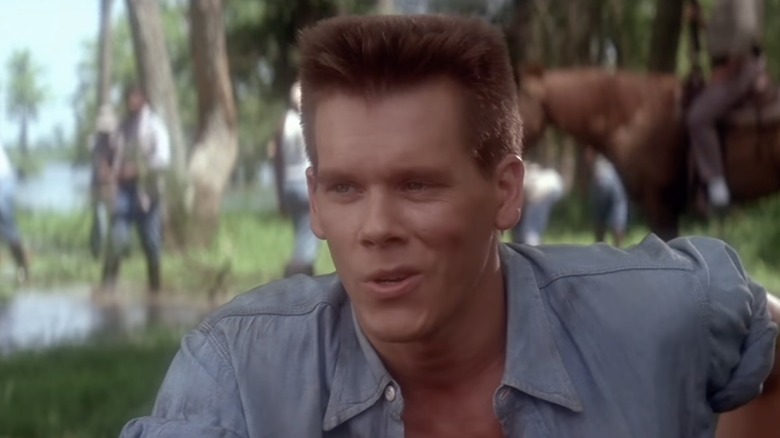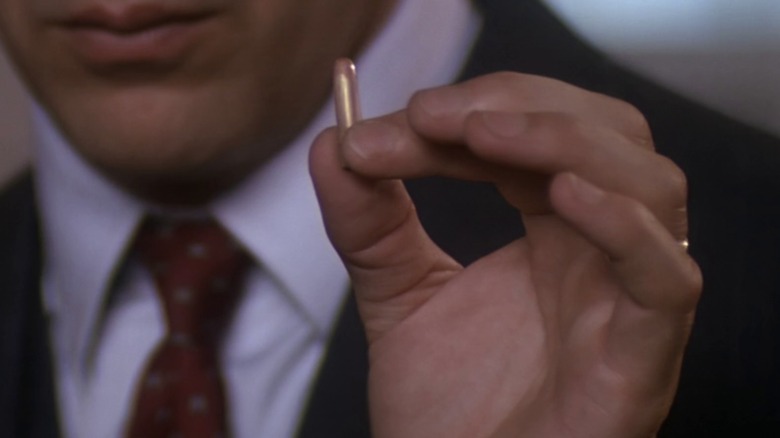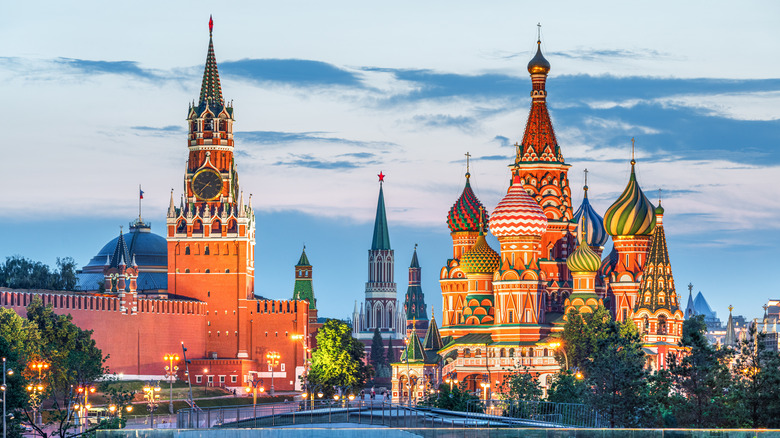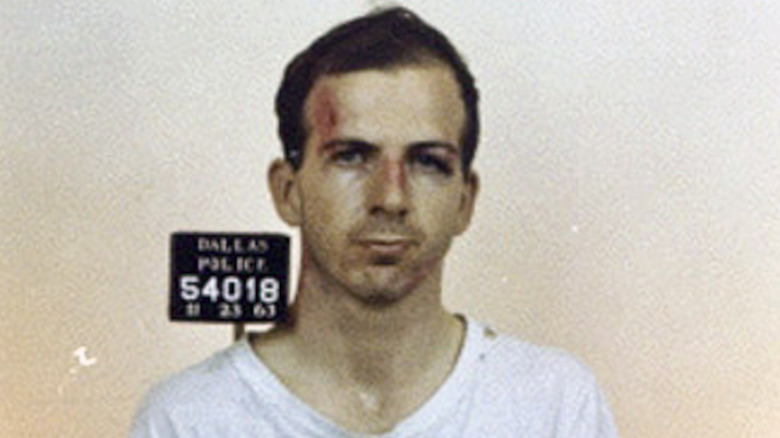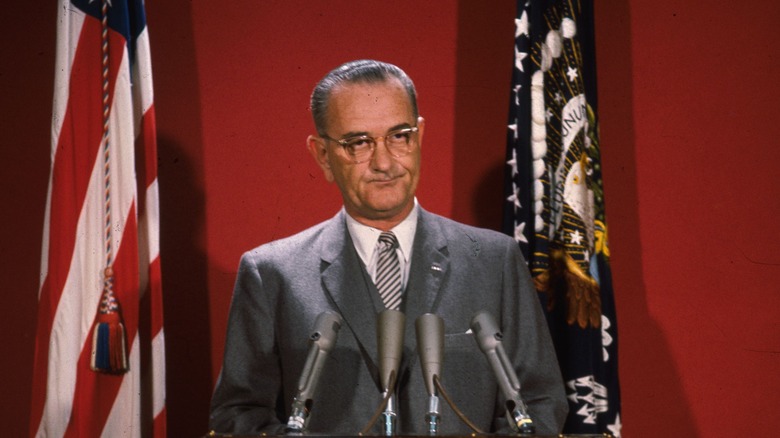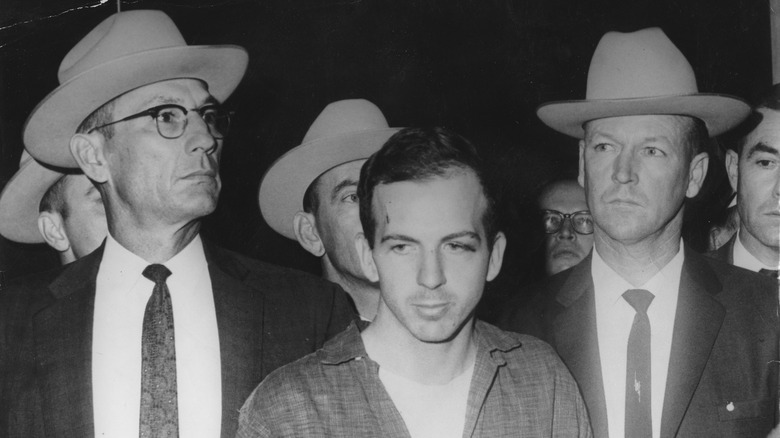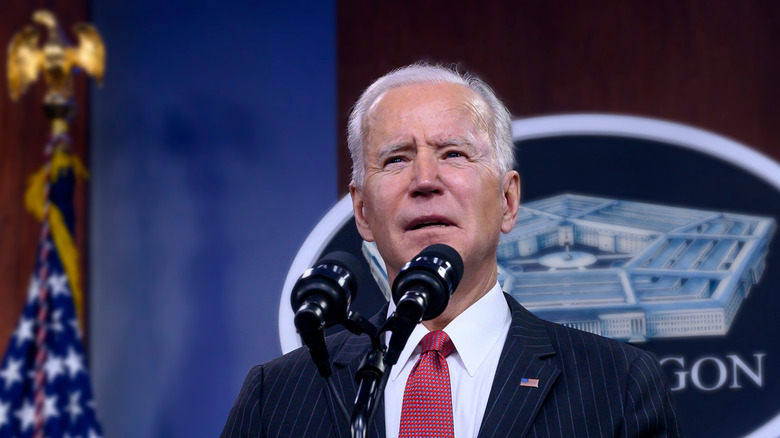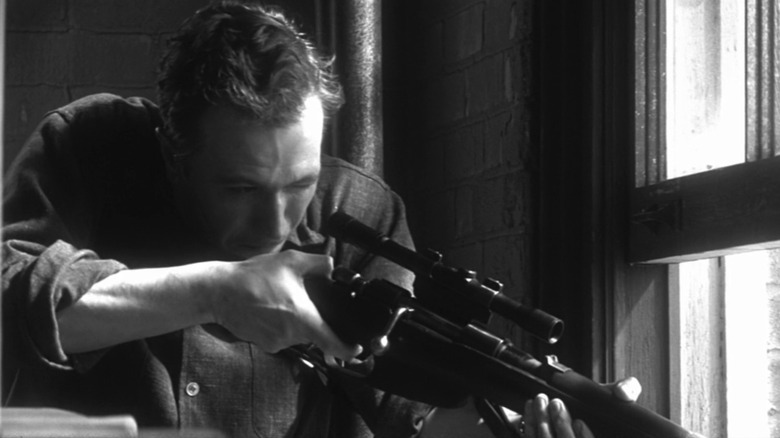Everything JFK Doesn't Tell You About The True Story
Oliver Stone's 1991 Oscar-winning film "JFK" was controversial because it challenged the Warren Commission Report, which concluded in 1964 that the assassination of President John F. Kennedy on November 22, 1963, was carried out independently by Lee Harvey Oswald and there was no conspiracy involved (per History). Stone's film took inspiration from the book of former New Orleans district attorney Jim Garrison, "On the Trail of the Assassins," which shared the information Garrison compiled to unsuccessfully prosecute a businessman named Clay Shaw for conspiring with Oswald to kill Kennedy.
Kennedy's assassination has long been a subject of speculation amongst the American public. Oswald's murder by Jack Ruby soon after his arrest only intensified public speculation. According to a Gallup poll taken the week that Kennedy was killed, over half of the U.S. population believed there was more than one man involved in the assassination. Stone's film played into these suspicions, drawing big numbers at the box office, despite the rancor it inspired in journalists, critics, and officials who thought the film undermined the official story by muddling fact with fiction.
Stone's film is a dizzying collection of images and theories — some drawn from historical sources, while others were created specifically for this film. This approach visually muddles the difference between a documentary and a movie, luring audiences into the conspiracy theories Stone's film spun. Washington communications consultant and film advisor Michael Feldman told The Washington Post, "We have a whole fact-versus-fiction practice now because of" the film. Stone's film was an impressive feat of filmmaking, regardless of its questionable veracity. Join us as we explore everything "JFK" doesn't tell you about the true story.
Some believe the film legitimized conspiracy theories
30 years after Oliver Stone's "JFK" came out, Americans are still living in a society where conspiracy theories are prolific, and large swaths of society accept concepts like "alternative facts" and "fake news." In this fractured society, there is no longer a consensus about reality; there is no truth with a capital T. In 2021, Mark Updegrove, president and CEO of the LBJ Foundation told The Washington Post, "I don't know how much relevance 'JFK' has today. I've never seen evidence that it's a significant work of cinema for younger audiences. But I do think it was seminal insofar as it legitimized wide-eyed conspiracy theory."
It appears the theories that lead to the prosecution of Clay Shaw in New Orleans in 1969 and later to the publication of Jim Garrison's book in 1988 — and Stone's 1991 film — continue to revive the public's questions about what really happened on November 22, 1963. Despite the consistent release of documents concerning the assassination of President Kennedy, some members of American society will never believe Oswald acted alone. Tim Weiner, with Rolling Stone, explained, "Stone's 'JFK' films are fantasies. Conspiracy theories are not facts. They're a kind of collective psychosis. And they're driving our country down the road to hell."
In 1992 Congress passed the John F. Kennedy Assassination Records Collection Act
As detailed by VOX, because of public pressure, partly due to "JFK," Congress passed the John F. Kennedy Assassination Records Collection Act, providing funding for the Assassination Records Review Board to reexamine and declassify records concerning Kennedy's assassination. The Review Board's summary stated, "The major purpose of the Review Board was to re-examine for release the records that the agencies still regarded as too sensitive to open to the public."
The JFK Act sped up the release deadline of the House Select Committee on Assassinations records from 2029 (the date noted in the epilogue of "JFK") to October 26, 2017, with the allowance that the President could delay records for national security reasons. In 2017, President Trump said he would release the remaining records, but reneged on the promise in 2018, citing national security. In 2021, the Biden White House released a memo saying the final release of records was being pushed back to December 15, 2022, because of COVID-19. The declassified records are housed at the National Archives and are available to the public (per NPR). The White House has also requested that archivists digitize the JFK collection to make it available online so the public can draw their own conclusions about President Kennedy's assassination. The hope of the Review Board was that being transparent and releasing records concerning the assassination would improve the government's credibility with the public.
In 2021, Stone returned to Dallas for a fresh look
In the 2021 Showtime documentary, "JFK Revisited: Through the Looking Glass," Oliver Stone revisits Dealey Plaza, the site of President Kennedy's assassination, and re-assesses the events. The film includes information that was declassified after the 1992 JFK Act, and in the companion piece, Stone doubles down on his stance that Lee Harvey Oswald was not a lone gunman and that there was a conspiracy to assassinate the U.S. President. Despite some new material released after the JFK Act leading to additional witness interviews, this documentary treads familiar ground by focusing on the single-bullet theory, while introducing questions about the authenticity of CE 399 that were revealed by previously classified FBI documents. It also addresses questions about the autopsy and discrepancies concerning autopsy photographs.
Stone's documentary also focuses on the improbability of the timetable surrounding Lee Harvey Oswald's location in the break room on the second floor of the Book Depository after allegedly being on the sixth floor to shoot Kennedy. It also questions Oswald's rushed trip back home to retrieve a handgun before allegedly shooting a police officer and being apprehended in a movie theater.
Even before JFK came out, Oliver Stone said it wasn't based on historical fact
In 1991, months before "JFK" came out, Stone told The New York Times, "I've taken dramatic license. It is not a true story per se. It is not the Jim Garrison story. It is a film called 'JFK.' It explores all the possible scenarios of why Kennedy was killed, who killed him, and why." Stone then made comparisons between "JFK" and the revered Japanese film "Rashomon," which depicts the same event from multiple perspectives.
Stone acknowledged that the film is not based on fact, but is instead an exploration of a myriad of theories about what could have led to the tragic murder of our president in 1963. As reported by the Times, Stone insisted everything in the film has been exhaustively researched and documented and isn't pulled from paranoia or crack-pot theories. Stone said in the piece, "The theme is more why Kennedy was killed rather than who did it. It's a whydunit."
Stone told the Times he initially believed the findings of the Warren Commission, but like many Americans, because of a series of events in the '60s and '70s, Stone lost confidence in the honesty of his government. "This was compounded by the House assassination probes, which came up with the idea that it was a conspiracy and that the Government had done a very shoddy job of investigating it," he said. Regardless of admitting the film isn't fact-based, Stone has never been shy about his belief that there was a conspiracy behind the assassination.
Russian disinformation might be the source conspiracy theory
According to Tim Weiner with Rolling Stone, in the late '50s, the KGB created a department of disinformation to bend public perception and defame the U.S., with Weiner calling it "the world's first industrial factory of fake news." Per Weiner, the theory shared in "JFK" that President Kennedy was killed by a conspiracy involving the CIA may have been started by a KGB disinformation campaign. In 1967, days after Clay Shaw was arrested in New Orleans, Paese Sera, an Italian newspaper backed by the Italian communist party, printed a KGB-crafted story depicting Shaw as a CIA operative, rather than a part-time informant who volunteered information during the Cold War. The story was covered in other publications stateside, and Jim Garrison, the New Orleans DA, used this article to legitimize Shaw's arrest.
Per the Rolling Stone investigation, this Paese Sera article and the Clay Shaw trial aroused suspicions, and more Americans believed in a conspiracy surrounding the assassination of and investigation into the murder of Kennedy. Later, Garrison published a book about the trial and his investigation, gaining the attention of director Oliver Stone, which led to a successful film and more people believing the conspiracy. Reportedly after the release of "JFK," three out of four Americans believed the CIA murdered Kennedy. Essentially, Weiner, who is the author of "Legacy of Ashes: The History of the CIA" and a well-informed expert on the intelligence community, contends that this conspiracy theory was started by the KGB before bleeding into the fabric of U.S. culture and beliefs about government and history.
Some believe Garrison's prosecution of Clay Shaw was influenced by a homophobic culture
Although Clay Shaw (Tommy Lee Jones) and David Ferrie's (Joe Pesci) sexual orientation is no secret in the film "JFK," it isn't presented as a motivating factor for the investigation and prosecution of Shaw. The only suggestion that sexual orientation was a factor comes in an argument between Jim Garrison (Kevin Costner) and his wife, Liz (Sissy Spacek), when she suggests Shaw's homosexuality is Garrison's motivation, but he quickly brushes her accusation aside.
In "Cruising for Conspirators," Louisiana State University Professor Alecia Long argues that a homophobic culture heavily influenced the DA's case against Shaw and that the prosecution was, "not based in fact but was a product of the criminal justice system's long-standing preoccupation with homosexuality." While Professor Long makes no assertions that Garrison himself was homophobic, Garrison has been quoted, by many journalists writing about the Shaw case, as having called the assassination a "homosexual plot" or "homosexual thrill killing" (per Huffington Post).
Long points out in her well-researched book that homosexuality was illegal in New Orleans in the '60s, and this illegality made it more difficult for men like Shaw to launch a successful defense because there were certain aspects of their personal lives they must avoid discussing in court to avoid further charges. Long also addresses the cultural misconceptions of 1960s New Orleans, linking gay men with violence and depravity, which could have influenced Garrison's suspicions about Clay Shaw's involvement in a conspiracy (per Washington Decoded).
Garrison's investigators used sodium pentothal and hypnosis to elicit Perry Russo's memories
In the film "JFK," a television show attempts to discredit Jim Garrison's case against Clay Shaw by making veiled references to Garrison's investigators drugging his witnesses. The film does not depict an insurance salesman named Perry Russo being administered sodium pentothal and being hypnotized to elicit the memory of Clay Shaw, Lee Harvey Oswald (Gary Oldman), and David Ferrie discussing wanting to kill Kennedy in 1963 during a party. In fact, Perry Russo isn't a character in Oliver Stone's film.
Kevin Bacon's character, Willie O'Keef, is a fictional character who is a composite of multiple witnesses, including Perry Russo. The film does not include the drugging and hypnotism, probably because it would make Garrison's case look even more preposterous (per The Guardian). Writer Patricia Lambert's book, "False Witness: The Real Story of Jim Garrison's Investigation and Oliver Stone's Film, JFK," explores the information obtained from the key witness Perry Russo and Garrison's questionable investigation tactics, arguing he was a "fame-seeking demagogue," in opposition of Stone's portrayal of Garrison in the film "JFK."
The CE 399 may have been placed in evidence fraudulently
"JFK" spends a fair amount of time and energy debunking the Warren Commission's single-bullet theory, demonstrating the questionable trajectory of the bullet, calling it a "magic bullet" because CE 399 is still intact and undamaged despite the damage it hypothetically inflicted on two men, causing multiple wounds on each man, before being found by an employee on a stretcher at Parkland Hospital where President Kennedy and Governor Connally were treated after being shot.
The declassification and release of certain FBI files revealed discrepancies, making it unlikely the bullet in evidence (CE 399) is the bullet found on the stretcher in Parkland Hospital. As reported by History Matters, the FBI chain of custody for CE 399 is a mess. One agent, Bardwell Odum, says he was never in possession of the bullet, while neither Tomlinson nor Wright (two agents who were part of the chain of custody) could identify CE 399 as the bullet from the stretcher in Parkland Hospital.
There are also discrepancies regarding the times the bullet was passed from one agent to another in the chain of custody and missing 302 reports, leading some to believe CE 399 was entered into evidence fraudulently and it isn't the same bullet from the stretcher in Parkland hospital. So much effort has been put into disproving the single-bullet theory and the authenticity of CE 399 in both "JFK" and "JFK Revisited" because it is the crux of the Warren Commission's position that Lee Harvey Oswald acted alone, there was no conspiracy, nor a second gunman near the grassy knoll.
The KGB believed there was a well-organized conspiracy
A memo from the office of J. Edgar Hoover that was declassified after the JFK Act and released to the public in 2017 revealed the reaction to President Kennedy's assassination in the U.S.S.R. None of the following information was included in "JFK" because the memo was released decades after the film. In the memo, a source who was in Russia at the time of Kennedy's murder reported his death was, "greeted by great shock and consternation and church bells were tolled in the memory of President Kennedy."
The memo reports a reputable source said Russian intelligence believed there was a conspiracy behind the assassination of President Kennedy involving the "ultraright" and that it was not the act of one man. They thought the U.S. "would then utilize this act to stop negotiations with the Soviet Union, attack Cuba and thereafter spread war." Considering tensions between the United States, Cuba, and the Soviets amid the Cuban missile crisis, Russian intelligence worried the fallout Kennedy's death could bring to the tenuous peace. The memo stated, "As a result of these feelings the Soviet Union immediately went into a state of national alert," after Kennedy's death.
From this memo, we also learn that Soviet Colonel Boris Ivanov, KGB, wanted his intelligence network to "ascertain with the greatest possible speed the true story surrounding President Kennedy's Assignation." The memo stated the KGB later came into, "possession of data purporting to indicate President Johnson was responsible for the assassination of the late President John F. Kennedy." This doesn't mean this KGB theory is true, of course, since the KGB was conducting disinformation campaigns aimed at the U.S.
Lee Harvey Oswald allegedly attempted suicide while living in Russia
According to a memo from the office of J. Edgar Hoover at the FBI released in 2017 after the 1992 JFK Records Act, Lee Harvey Oswald was hospitalized after an alleged suicide attempt while he was living in Russia. In this memo, a reputable source told the FBI "Soviet officials claimed Lee Harvey Oswald had no connection whatsoever with the Soviet Union. They described him as a neurotic maniac who was disloyal to his own country and everything else," adding Oswald was never given Soviet citizenship while visiting Russia.
The memo also stated that Yuri Nosenko, a Soviet defector whose credibility had not yet been established, claimed he was aware of Lee Harvey Oswald while he was in Russia after Oswald tried to defect to the Soviet Union. The source relayed the KGB denied Oswald's request because he was "mentally unstable." After being informed he must return to the U.S. when his visit was over, Oswald missed a sightseeing tour and was subsequently found in his hotel room with one wrist slashed. Oswald was hospitalized and stayed in Russia temporarily after his injury with the help of the Red Cross and the Ministry of Foreign Affairs.
If you or anyone you know is having suicidal thoughts, please call the National Suicide Prevention Lifeline at 1-800-273-TALK (8255).
President Johnson thought Kennedy's assassination was payback
Another theory about Kennedy's assassination that was not addressed in "JFK" concerns the assassination of another world leader that transpired just before Kennedy was killed. The South Vietnamese President Diem was assassinated on November 2, 1963, weeks before President Kennedy met his end in Dallas, Texas (per History). Although the U.S. initially claimed to have no prior knowledge about the South Vietnamese soldiers' plot to overthrow Diem's government, in 2003, White House tapes revealed U.S. officials were aware of these plans at the highest levels. But these tapes also suggest U.S. Officials, including President Kennedy, were unaware of the South Vietnamese General's plans to kill Diem.
In a 1975 deposition of Richard Helms for the Rockefeller Commission that was declassified and released in 2017, former CIA director Richard Helms is quoted saying, "President Johnson used to go around saying that the reason President Kennedy was assassinated was that he [Kennedy] had assassinated President Diem... He certainly used to say that early in his Presidency and where he got this idea from I don't know." This deposition certainly suggests President Johnson may have known more about the Diem assignation than Richard Helms did. Although if you read to where the deposition cuts off, one can't help but wonder what Helms' answer would have been about Oswald and alleged CIA ties.
The FBI received an Oswald death threat the day before his murder
Documents released in 2017 after declassification indicate that the FBI received a death threat for Oswald the day before Jack Ruby killed him. Much of the text is difficult to discern but we can make out this statement, "last night we received a call in our Dallas office from a man talking in a calm voice and saying he was a member of a committee organized to kill Oswald."
It appears the FBI called the Chief of Police that night and again the next morning because of their concerns for Oswald's safety, but were told both times Oswald would be protected. The frustration of the FBI is clear in this document when they say how Oswald was not protected by Dallas police, and Oswald did not deliver a deathbed confession to the FBI agent at the Parkland Hospital. This document also states Ruby did not admit to making the phone call to the FBI and claims to have no connections to Oswald.
The document explains how the Dallas Police had no case without the information the FBI provided and that Oswald wouldn't have gotten a fair trial in Dallas, wondering if the same would be true for Ruby. They also voice a concern that without a trial some will doubt Oswald killed the president. The document ends with the statement, "Oswald having been killed today after our warnings to the Dallas Police Department was inexcusable" followed by information about Jack Ruby.
President Biden has delayed the release of the remaining records
In 2021, President Biden delayed the release of the remaining assassination records citing COVID-19 and this statement: "Temporary continued postponement is necessary to protect against identifiable harm to the military defense, intelligence operations, law enforcement, or the conduct of foreign relations that is of such gravity that it outweighs the public interest in immediate disclosure." These delays follow similar delays during President Trump's administration.
According to the National Archives, "Approximately 88% of the records in the Collection are open in full. An addition 11% are released in part with sensitive portions removed. Approximately 1% of documents identified as assassination-related remain withheld in full." CIA files account for most of the records that are still withheld. Although most Kennedy assassination specialists and academics do not believe the missing files contain a bombshell about who killed Kennedy, they believe these files would shed light on covert operations during the Cold War and Watergate (per Politico).
Most Americans still believe Lee Harvey Oswald didn't act alone
A Gallup poll taken in 2013, 50 years after the assassination of Kennedy, suggested that 61% of Americans still believe there was a conspiracy surrounding the assassination and that Lee Harvey Oswald did not act alone. According to NBC News, "they've been skeptical from the beginning." Few things have engaged the American psyche like Kennedy's murder. It is our indelible mystery, and it is burned into our collective brains. This mystery preys on our fears we have been lied to and it attracts conspiracy theorists like bees to flowers.
Many books, both nonfiction and fiction, have been written about the myriad theories surrounding Kennedy's assignation. Documentaries have been made and films like "JFK" have tried to unravel the mystery behind this collective trauma. We may never know the truth, even if they release all the assassination files to the public. It is possible we already know the truth. Maybe Lee Harvey Oswald made a one-in-a-million shot? Oliver Stone's "JFK" tapped into this collective uncertainty, encouraged us to ask questions and influenced legislation for more transparency in government.
